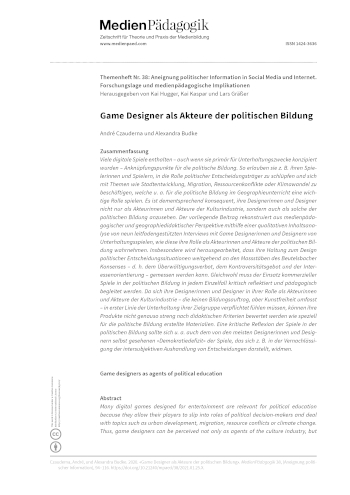Abstract
Many digital games designed for entertainment are relevant for political education because they allow their players to slip into roles of political decision-makers and deal with topics such as urban development, migration, resource conflicts or climate change. Thus, game designers can be perceived not only as agents of the culture industry, but also as agents of political education. The present article reconstructs how designers of entertainment games shape this role, from the perspectives of media education and geography education, based on a qualitative content analysis of nine semi-structured interviews. In particular, it is shown that game designers’ positions towards the design of political decision-making are largely consistent with the «Beutelsbach Consensus», which constitutes a set of basic principles for political education in Germany. Nevertheless, since entertainment game designers are first and foremost obliged to entertain their players, their products cannot be judged according to educational criteria just as strictly as materials created specifically for political education. Therefore, the use of entertainment games in political education must be accompanied by an in-depth classroom discussion. A critical reflection of digital games in political education should discuss, among other things, their neglect of democratic negotiation processes.
References
Betsch, Tilmann, Joachim Funke, und Henning Plessner. 2011. Denken – Urteilen, Entscheiden, Problemlösen. Springer-Lehrbuch. Berlin, Heidelberg: Springer. https://doi.org/10.1007/978-3-642-12474-7.
Bogost, Ian. 2007. Persuasive games. Cambridge, MA: MIT Press.
Budke, Alexandra. 2016. «Potentiale der politischen Bildung im Geographieunterricht». In Politische Bildung im Geographieunterricht, herausgegeben von Alexandra Budke, und Miriam Kuckuck, 11–23. Stuttgart: Franz Steiner Verlag.
Csikszentmihalyi, Mihaly. 2009. Flow: The Psychology of Optimal Experience. Nachdr. Harper Perennial Modern Classics. New York: Harper [and] Row.
Cuhadar, Esra, und Ronit Kampf. 2014. «Learning about Conflict and Negotiations through Computer Simulations: The Case of PeaceMaker». International Studies Perspectives 15 (4): 509–24. https://doi.org/10.1111/insp.12076.
Czauderna, André. 2019. «Tinkering with Political Utopias and Dystopias in DEMOCRACY 3. An Educational Perspective». In Playing Utopia, herausgegeben von Benjamin Beil, Gundolf S. Freyermuth, und Hanns Christian Schmidt, 69–98. Bielefeld: transcript Verlag. https://doi.org/10.14361/9783839450505-003.
Czauderna, André. 2020. «Unvollständigkeit als didaktische Chance: Überlegungen zum Einsatz von DEMOCRACY 3 im Politikunterricht». In Videospiele als didaktische Herausforderung, herausgegeben von Nathanael Riemer, und Sebastian Möring, 266–291. Potsdam: Universitätsverlag Potsdam. https://doi.org/10.25932/PUBLISHUP-43074.
Czauderna, André, und Alexandra Budke. 2020. «How Digital Strategy and Management Games Can Facilitate the Practice of Dynamic Decision-Making». Education Sciences 10 (4): 99. https://doi.org/10.3390/educsci10040099.
Czauderna, André, und Emmanuel Guardiola. 2019. «The Gameplay Loop Methodology as a Tool for Educational Game Design». Electronic Journal of e-Learning 17 (3): 207–21. https://issuu.com/academic-conferences.org/docs/ejel-volume17-issue3-article682.
Dörner, Dietrich. 2002. Die Logik des Mißlingens: strategisches Denken in komplexen Situationen. 15. Aufl. rororo rororo-Sachbuch rororo science 19314. Reinbek bei Hamburg: Rowohlt.
Fromme, Johannes, Benjamin Jörissen, und Alexander Unger. 2008. «Bildungspotenziale digitaler Spiele und Spielkulturen». MedienPädagogik: Zeitschrift für Theorie und Praxis der Medienbildung 15: 1–23. https://doi.org/10.21240/mpaed/15_16/2008.12.22.X.
Gaber, John. 2007. «Simulating planning: SimCity as a pedagogical tool». Journal of Planning Education and Research 27 (2): 113–21. https://doi.org/10.1177%2F0739456X07305791.
Gee, James Paul. 2007. What video games have to teach us about learning and literacy. Rev. and Updated ed. New York: Palgrave Macmillan.
Guardiola, Emmanuel. 2016. «The Gameplay Loop: A Player Activity Model for Game Design and Analysis». In Proceedings of the 13th International Conference on Advances in Computer Entertainment Technology - ACE2016, 1–7. Osaka, Japan: ACM Press. https://doi.org/10.1145/3001773.3001791.
Klimmt, Christoph. 2010. Computerspielen als Handlung: Dimensionen und Determinanten des Erlebens interaktiver Unterhaltungsangebote. Unveränd. Nachdr. Unterhaltungsforschung 2. Köln: von Halem.
Lux, Joelle-Denise, und Alexandra Budke. 2020. «Playing with Complex Systems? The Potential to Gain Geographical System Competence through Digital Gaming». Education Sciences 10 (5): 130. https://doi.org/10.3390/educsci10050130.
Mayring, Philipp. 2010. «Qualitative Inhaltsanalyse». In Handbuch qualitative Forschung in der Psychologie, 601–13. Springer. https://doi.org/10.1007/978-3-658-26887-9_52.
Meier, Sid. 2012. «Interesting Decisions (GDC Talk)». Game Developers Conference. https://www.gdcvault.com/play/1015756/Interesting.
Motyka, Marc. 2018. Digitales, spielbasiertes Lernen im Politikunterricht. Wiesbaden: Springer VS.
Mounk, Yascha. 2018. Der Zerfall der Demokratie: wie der Populismus den Rechtsstaat bedroht. München: Droemer.
Preisinger, Alexander, und Florian Aumayr, Hrsg. 2020. Digitale Spiele im Geschichtsunterricht & in der Politischen Bildung. Wien: Edition polis.
Reckwitz, Andreas. 2019. Das Ende der Illusionen: Politik, Ökonomie und Kultur in der Spätmoderne. Edition Suhrkamp 2735. Berlin: Suhrkamp.
Riemer, Nathanael, und Sebastian Möring. 2020. Videospiele als didaktische Herausforderung. Potsdam: Universitätsverlag Potsdam.
Salen, Katie, und Eric Zimmerman. 2003. Rules of play: game design fundamentals. Cambridge, Mass: MIT Press.
Stanley, Jason. 2017. How Propaganda Works. First paperback printing. Princeton, New Jersey Oxford: Princeton University Press.
Steinkuehler, Constance, und Kurt Squire. 2014. «Videogames and Learning». In The Cambridge Handbook of the Learning Sciences, herausgegeben von R. Keith Sawyer, 2. Aufl., 377–94. Cambridge: Cambridge University Press. https://doi.org/10.1017/CBO9781139519526.023.
Wehling, Hans-Georg. 1977. «Konsens à la Beutelsbach. Nachlese zu einem Expertengespräch». In Das Konsensproblem in der politischen Bildung, herausgegeben von Siegfried Schiele, und Herbert Schneider, 173–184. Stuttgart: Ernst Klett.
Widmaier, Benedikt, und Peter Zorn. 2016. «Brauchen wir den Beutelsbacher Konsens». Eine Debatte der politischen Bildung. Bonn: Bundeszentrale für politische Bildung. https://m.bpb.de/system/files/dokument_pdf/1793_Beutelsbacher_Konsens_ba.pdf.

